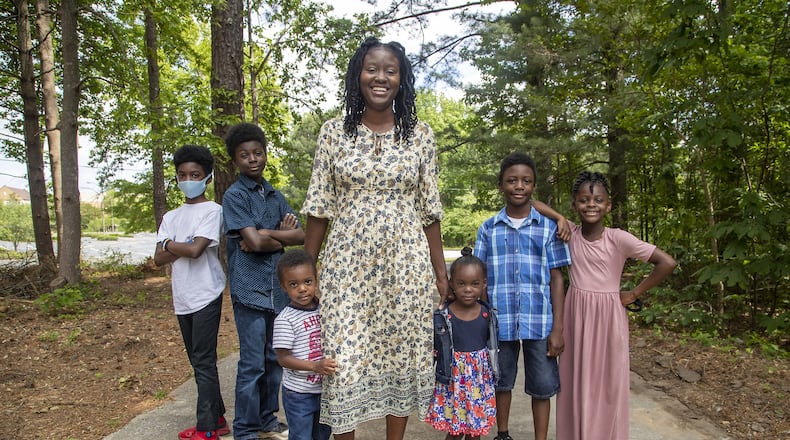When Marissa Anderson holds one finger in the air during her virtual 4th grade classes, it’s not a signal to any of the social studies or science students watching her teach.
It’s for one of her six children at home who may be asking her for something off camera - a signal that they must be quiet.
“Once I bring my finger down, I’ll press mute on the computer and say, ‘What is it? It’ll have to wait until I finish my class,’ said Anderson, who teaches at Hawthorne Elementary School in Clayton County. Her husband, an electrician, works outside the home
“I usually have a long list of things to do once I sign off from my class,” she said.
The move to virtual classrooms after schools shut down because of the coronavirus has presented a unique problem for teachers who are also parents — how to educate your students on the web when your own kids are at home and need you just as much. It’s a situation impacting thousands of educators across Georgia.
That has meant scheduling conferences with students around diaper changes, pre-recording video lessons to avoid being interrupted by requests for a snack or playtime. It may also mean kicking the family off Netflix or computer games to free up internet bandwidth so that live-stream classes don’t freeze or disconnect from the web in the middle of teaching.
“Whenever I’m meeting with students, or meeting with parents or my team at school on zoom, she’s just sitting there with me,” Bree Mavity, a 3rd grade teacher at Marietta Center for Advanced Academics, said of her six-month old daughter, Porter. “She can’t go and play on her own so she’s with me most of the time.”
Teachers, trying to keep their classrooms professional in what they assumed would be a week or so of online learning, said they tightly controlled their children at first with activities and strict schedules to keep home and work life separate.
But as it became obvious that schools would not open for the rest of the academic year, it grew harder to keep a valve on background noise at home, whether it be a hungry child, a barking dog or Amazon ringing the doorbell to let homeowners know a package had been dropped off.
“Trying to be online to talk to your students while your kids are coming up is a reality,” said Joyce Many, senior associate dean of undergraduate studies and educator preparation at Georgia State University. “It’s a lot of pressure on teachers.”
Administrators have taken notice, said Gyimah Whitaker, area superintendent of the south learning community for Fulton County Schools. Leaders in central offices across the metro area have let it be known that it’s alright if a teacher’s child sits in on a lesson or if instruction isn’t smooth because family life upended the best made plans.
“I approach this with empathy,” Whitaker said. “I have a 4th grader and a 7th grader who are going to knock on my door just like your child is going to knock on your door when you’re in the middle of a lesson. That’s powerful and they need to know that.”
Toni Phillips, who also teaches at Hawthorne Middle School and is the district’s teacher of the year, said buy-in from central office leaders is crucial. School systems that are doing this right have offered teachers flexibility as well as support. While there are guidelines on how to respond to natural disasters such as tornadoes and hurricanes as well as for school shootings, there is nothing on how to run a school system from your home during a pandemic.
“The support we have had has been phenomenal,” she said of Clayton Schools.
Joycelyn Jackson, the principal of Woodland Middle School in Henry County, and her husband, Purvis Jackson, principal of Henry’s Hampton Middle School, agreed. The pair, who have three children of their own - ages 2, 5, and 10 — have turned their dining room into what they call Jackson Academy because of the children’s school work and their own.
“We let the teachers know that having life happen while you’re teaching is OK,” Joycelyn Jackson said. “If your kids pop onto the screen it does not reflect your professionalism. It’s the life of a faculty member that has a family.”
Striking that balance is not limited to teachers, leaders in the profession acknowledge. Architects, waitresses, lawyers and everyone who have children and have been sheltering in place during the pandemic have struggled with separating family life and work.
Jodie Waldron, a Hickory Hills Elementary School teacher in Marietta and mother of a three children — ages 10, 7, and 5 — said the challenges have broken down barriers between her and her students and their parents. Letting her classroom into her home allows her charges to see her as more than their teacher, but as a mother who has to feed her family, keep a house together and juggle responsibilities just like their parents.
It also allows her to see what their parents may be struggling with and builds trust.
“I’ve been able to connect with parents in ways that I never would have before,” she said. “We’re all kind of experiencing this together.”
About the Author
Keep Reading
The Latest
Featured



